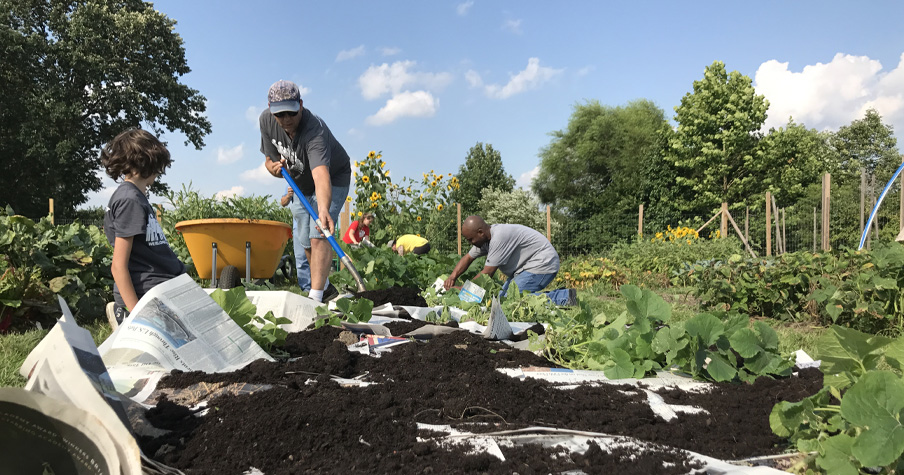
The vision of Edenic paradise was the point of creation and home of abundance for Adam and Eve – an arrangement disrupted only by sin. As a result, Adam was cursed to toil at working the land.
The quest to acquire or control agrarian resources is an underlying narrative of the Bible: The Psalms and Proverbs are full of farming analogies, and the framework of many of Jesus’ teachings requires understanding of the farm labor in which many of His original followers engaged.
Today, theological education is steeped in the rigors of academic work and pastoral application, but some seminaries have been embracing the spiritual connections with their land — integrating conservation and farming into their curricula and student life.
In 2007, Jason Santos had just completed his M.Div. at Princeton Theological Seminary and was pursuing a Ph.D. in Practical Theology. While researching intentional communities, he cultivated the concept of communal education among his doctoral studies cohort. Further influenced by Michael Pollan’s Omnivore’s Dilemma and the writings of Wendell Berry, Santos approached the seminary to inquire about using a plot of land on campus to start a garden with other students and raise ducks for eggs. His request granted, Santos became one of the original community gardeners at the seminary.
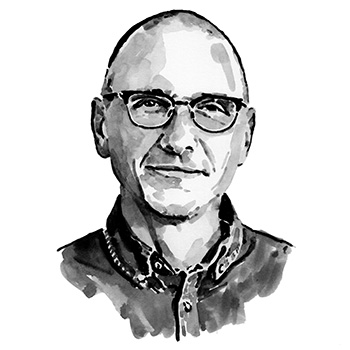
Portraits by Sam Kerr
Princeton farminary: Nathan stucky
We live in an exhausted world. Creation (including humans) groans with exhaustion. The soils, stream, forest, and history of the farm bear witness to this, but they also point to a Creator whose desire for creation is justice, peace, vitality, and rest. What if the Church was known for bringing rest and renewal to spaces and places currently marked by exhaustion, exploitation, and injustice? The world needs that Church very much. I need that Church.
That same year, he struck up a friendship with a newly enrolled student studying for a Master of Arts at the Seminary. Nathan Stucky grew up in a farming family in Kansas and was drawn to the everyday application of theology. He enrolled in 2007; within his first few years he changed his program to pursue the Master of Divinity degree, believing the M.Div. would bring him closer to exploring this ministry.
Stucky and Santos began asking themselves: “What would happen if a seminary embraced communal learning and farming?”
Their shared interests coincided with the Seminary’s purchase in 2010 of a nearby 21-acre plot of land. Further inspiration came from a group of students which had initiated a community gardening program on campus.
Thus began a process of conceptualizing a working and learning center on campus. Stucky, by then a doctoral student, says it was “planning, theory, and budgeting – all while I was working on my dissertation” for a farm and ecological education center at Princeton.

Photos courtesy Princeton Theological Seminary
“When I brought these ideas to Seminary President Craig Barnes in spring 2014,” Stucky laughingly recalled, “he responded by cocking his head to the side like a confused dog.”
But Barnes quickly saw the potential of the program as a center for faithful earth stewardship, and an opportunity to utilize a valuable piece of property the seminary already owned.
The conversation set in motion preparations for the Farminary Project. With Barnes’ support and the enthusiasm of faculty and students, Stucky was asked to lead the project; a steering committee was formed and in 2015 a pilot course was initiated. Planting began on the 20,000-square-foot garden overlooking the farm’s pond.
In the beginning, Stucky says “the goal was to make sure we had at least one graduate course happening at the farm every semester.” Within two years the school had approved what they initially called a Certificate in Theology, Ecology and Faith Formation; today it is offered as a concentration within a range of graduate-level degree programs.
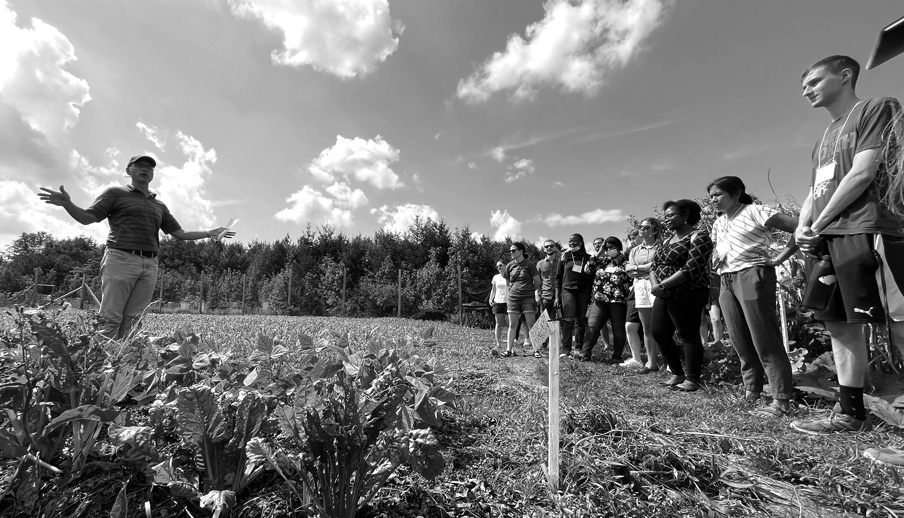
Food justice and ecological stewardship are an important part of Princeton Farminary’s interest in fostering intentional communities for historically marginalized peoples.
Creating Intentional Communities
The Farminary’s produce is used by the campus kitchen, and they’ve also developed a CSA (Community Supported Agriculture) program providing shares of summer crops to approximately 25 people, in addition to donating 10 shares to local food banks.
Professors have been eager to bring their courses from the main campus to the farm, offering students a fresh perspective outside the traditional classroom, including systematic theology, preaching, and Old Testament.
Esther Chiang completed her Master of Divinity in the spring of 2023 with the concentration in theology, ecology, and faith formation. Originally from Massachusetts, she started at Princeton Seminary in fall 2020 (during the pandemic) and completed her first year online. Chiang heard about the Farminary from orientation and other students; her first exposure came in summer 2021.
“Nate reached out to our class and said they were looking for workers for the farm that summer,” she recalls. “I was already going to take my Hebrew language course on campus so I thought, ‘Oh, I might as well work on the farm while taking the language class.’” She took at least one class per semester, even raising goats as part of the course “Society and Culture in Ancient Israel.” In addition to a land lab that encouraged students to think theologically about soils, Chiang studied pastoral implications for farming communities in rural America. Today, Chiang is a high school teacher in New Haven, Conn., where she teaches courses on ecology.
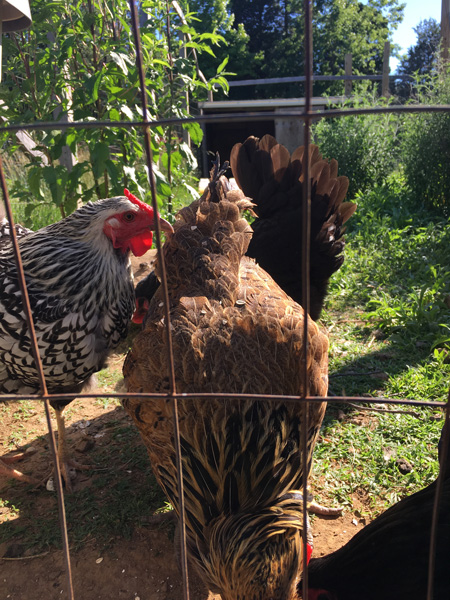
Candace Lovelace, a student in the newly formed Master of Arts in Theology and Ecology degree, completed her Master of Divinity in May 2023. She was interested in the intersection of ecology and theology from her introduction to Princeton Seminary.
Raised in Atlanta, Ga., Lovelace spent summers on her grandparents’ farm in rural Alabama where she developed a love for the outdoors and gardening. “It always felt really different for me, very replenishing,” she says. “I think there’s something that sees open space and farming as a positive emotional and spiritual opportunity.” One of Lovelace’s first courses at the seminary was “Land, Food and the Black Church,” taught by Heber Brown III, a leader in the food-justice movement and a proponent of community gardens and ecological stewardship in urban settings. It brought together many of her ideas about how the Church cares for others.
Lovelace says her ideas of ministry were transformed by working with the Farminary, leading her to a “wild idea:” developing a rural retreat space for Black pastors and other community leaders.
She says the demands of ministry and the need for restoration and respite for Black church leaders is often overlooked. “We don’t often make time for rest; this degree program and work at the farm is allowing me to develop this retreat idea.”
Another important factor for Lovelace, who is Black, and Chiang, who is Chinese, is creating a connection to the land for people whose ancestors’ agricultural labor was stolen or exploited in the process of building America: slaves, indentured servants, migrant laborers, and others. Confronting this type of historic racism is a hope shared by other institutions, as well.
“There are some nuances that need to be addressed, (such as) forced migration and strife that I think reasonably exist with the land because of its use and misuse by others to subjugate Black Americans and others,” says Lovelace. “It creates a disconnection – to a metaphysical homeland and a physical homeland.”
Chiang agrees, and has used her educational experience to create curricular units she’s implemented for the high school students she’s now teaching.
“My experience at the farm helped me form a curriculum that shows how capitalism can destroy our relationships to the land, whether it’s Indian boarding schools, slavery, militarization and imperialism, forced migration, migrant farm workers – and how we support them.”
“Invest in the millennium. Plant sequoias…. Put your faith in the two inches of humus. That will build under the trees every thousand years….”
(Wendell Berry, The Mad Farmer Liberation Front)
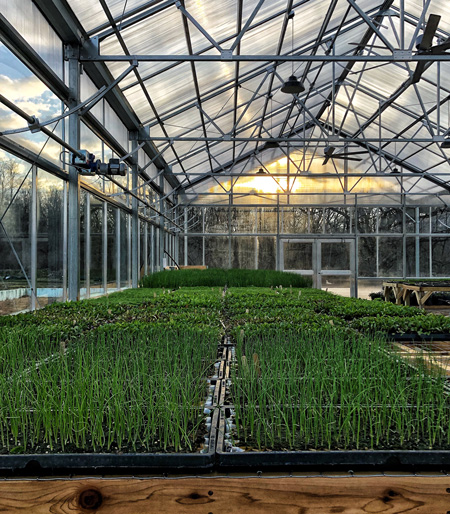
Photos courtesy Methodist Theological School in Ohio
Stewardship and Justice
Princeton Seminary isn’t alone among theological schools in incorporating ecology, agrarian practices and land stewardship into its curriculum. Schools at Duke, Wake Forest, Yale (in partnership with Yale University’s gardens), Lutheran, and Chicago, among others, have programs where students both reflect theologically and pursue justice issues, including access to fresh food in urban areas, climate action, and natural resource management.
At the Methodist Theological School in Ohio (MTSO), on-campus students and faculty receive farm-to-table produce in their dining hall. Timothy L. Van Meter, Ph.D., associate professor of Christian Education and Youth Ministry and coordinator of Ecological Initiatives, says that the school’s Seminary Hill Farm has the shortest supply chain of any institution in Ohio – mere feet from the garden to the door of the campus’ kitchen. Like Princeton, a CSA group provides shares of the farm’s produce to 60 people; more than 20% of the crops are donated to food programs.
With two five-acre plots on its Delaware, Ohio, campus, in close proximity to Columbus, the initiative has become an ecological training ground for seminary students and for coursework with nearby universities.
The school has designed three degree programs centered on ecology: the M.Div. in Ecology and Justice; M.A. in Practical Theology of Ecology and Justice; and a D.Min. in Ecology, Justice and Ministry. Together they offer over a dozen courses delving into the theological connection to the environment, economic justice, resource utilization, and access to food.
Van Meter says faculty and students began dreaming about incorporating farming practices and better stewardship of MTSO’s 80-acre campus into a theological locus around ecology as early as 2008. Van Meter credits MTSO President Jay Rundell with the vision and courage to advance the project, and to bring the school’s trustees on board. Initially proposing the purchase of nearby land or a farm, by 2013 Rundell initiated the work on the existing campus itself and hoop houses (unheated structures similar to greenhouses) were constructed for produce in early 2014.
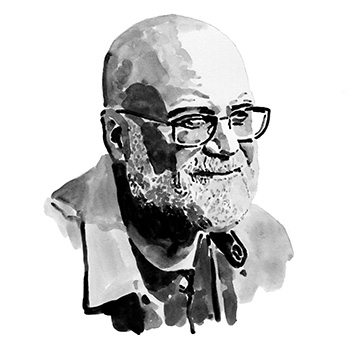
Portraits by Sam Kerr
Seminary Farms: Timothy L. Van Meter, Ph.D.
I can’t imagine a better place for creative theological imagination. We are letting the land and place lead us, in alliance with our mission and vision, toward a new way of thinking theologically, toward resilent communities, toward hospitality, toward educating students with the imagination to take on climate change and other ecological problems. This is not a demonstration farm; this is a farm that comes authentically out of who we are.
Seminary Hill Farm employs a full-time farm manager and a work coordinator to manage students who work anywhere from eight to 40 hours per week, in addition to organizing the CSA, ecotheology course interns, and community food distribution.
Christopher Carter joined the MTSO faculty this summer as associate professor of theology. His interest in ecotheology, along with food and religion, led him to the seminary.
“I saw how my work tied into what the institution envisioned, and I think I have grown in my relationship with what the school and the farm are doing for theological education,” he says. “Relationships with others and ecology profoundly shape theological education; the starting point is that we are all interconnected.”
Beyond the classroom, MTSO has integrated the practices of Seminary Hill Farm into a broader understanding of calls to ministry. Kathy Dickson, director of vocational discernment and a graduate of the school, leads the Community Food and Wellness Initiative that partners with area churches and community groups on issues of food and health.
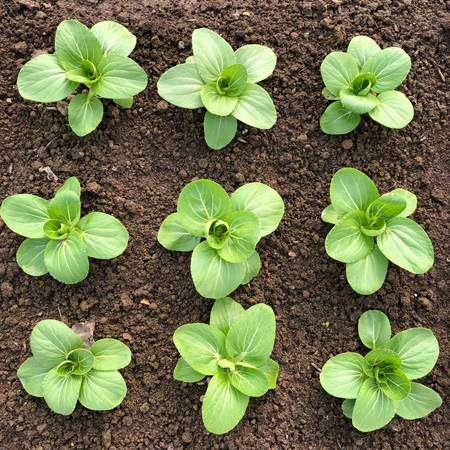
Seminary Hill Farm connects theology, ecological stewardship, and community service that models a church engaged in the spiritual needs of both the faithful and the unchurched.
She says she “can’t separate” her understanding of theology, service to the community, and a responsibility for ecological stewardship. Offering practical experience beyond traditional clerical roles, she believes the seminary is better preparing ministers to serve the needs of their communities. And incorporating community outreach and coordination with other institutions offers a model of the Church that shows “a way for ministers to meet the spiritual needs of those who may never enter a church.”
Leigh Precise, MTSO’s chief operating officer, sees this practical theological application in the lives of clergy.
“The thought and hope is that students will go out into the world and, if they have land, that they might turn it into a small garden,” she says. “They’ll also have know-how to organize people to help with food security or community involvement.”
In the decade since the farm was established, it has grown to include more land and become an integral part of the seminary’s life and educational experience.
“All of our curriculum has been revised in the past year or so to be more intentional about how we access the farm,” says Precise.
Helping others connect to the school and to the land allows the seminary to “healthy neighborly connections” with people in the community and, as is illustrated by the summer 2023 internship collaboration with The Ohio State University, inroads into academic settings.
Carter says it is impossible for students to miss the connections to ecology in their coursework. “Within systematic theology it’s going to come up especially when we talk about a few parts,” he says. “When we talk about creation, because that’s going to be just central, right? It’s the place to start the conversation.”
Are we willing to wrestle with the really complicated relationship between Christian faith, the Church, and an exhausted world? The times when the Church has contributed more to exhaustion than to renewal?
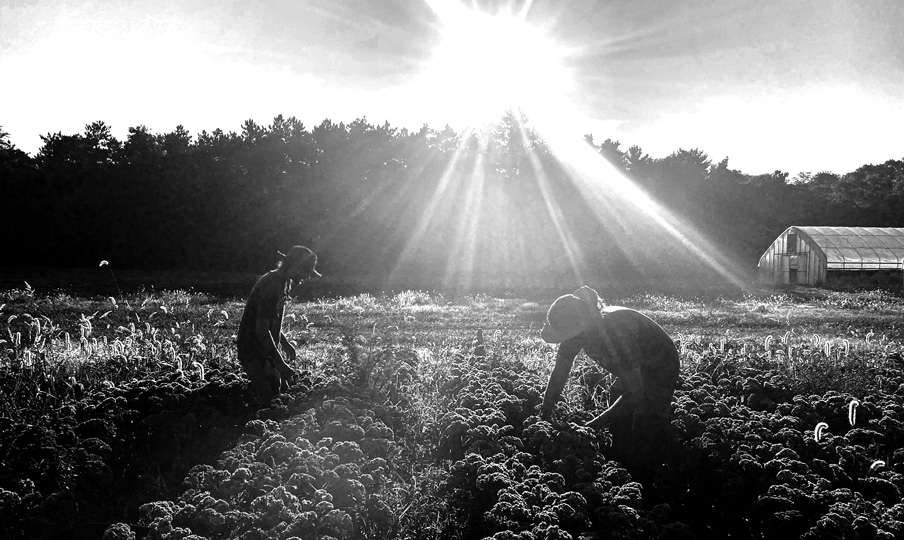
But Carter finds a more interesting place environmental care emerges is in discussing the elements of the Eucharist, bread and wine, or considering the resurrection and “this notion of what it means to see people or the metaphor of Jesus as the bread of life. This idea of weaving ourselves into this broader narrative that connects us literally from the soil right to the broader world – it’s a boundary breaking practice.”
The rapid growth of ecologically focused offerings across theological education institutions is no mystery to MTSO’s Carter who says he helps students explore “an awareness of how we think about structural inequalities when we’re talking about agriculture,” and who has historically worked the land.
“When you combine the relational aspects of the ecological ethos with the realities of global climate change and what every farmer, every consumer, and every institution, every church is going to be facing, it positions students that are interested in going into ministry, within or outside of parish ministry, with robust tools for these issues,” Carter says.
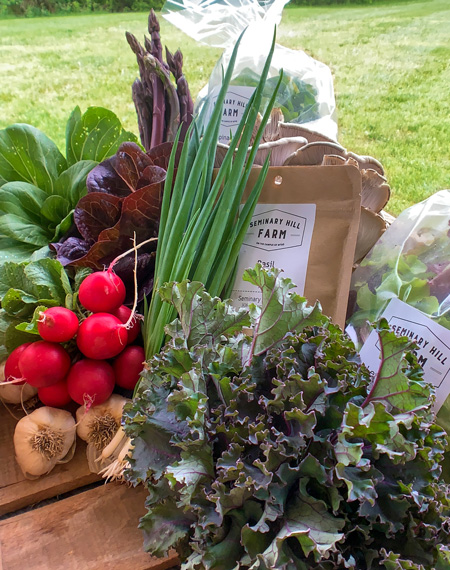
“We are literally cultivating relationships with the land which helps us to cultivate relationships with others.”
Princeton’s Stucky is pondering next steps in the development of Farminary, asking what Christian faith has to contribute to address ecological depletion, a legacy of environmental racism and exploitation, and climate change.
“Are we willing to wrestle with the really complicated relationship between Christian faith, the church, and an exhausted world?” he asks. “The times when the church has contributed more to exhaustion than to renewal? What would be like to tip the scales in the other direction?”
The relevance of the church in society is at stake, he says. He believes seminary farm initiatives may be one way to address its significance.
“If we are not addressing some of these questions that live at the intersection of theology and ecology, that’s just looking more and more suspicious as time goes on.”




























